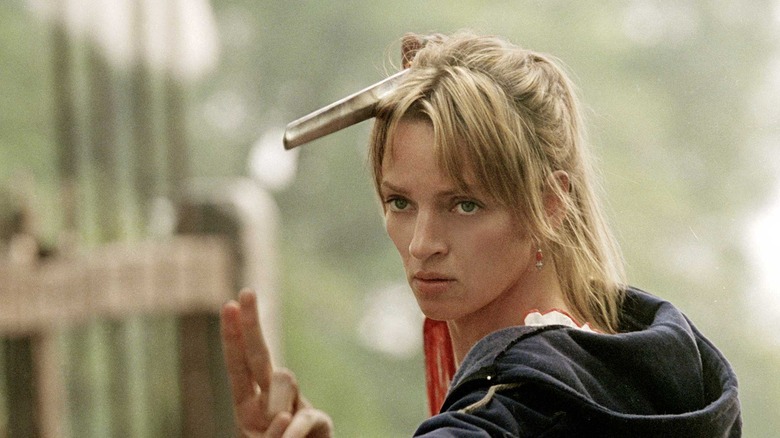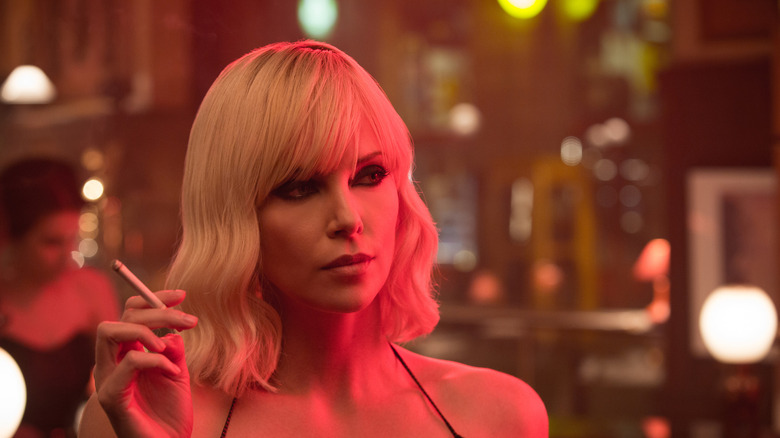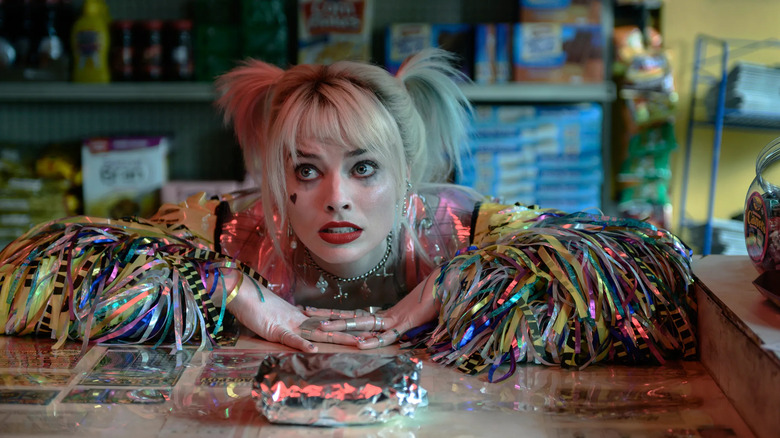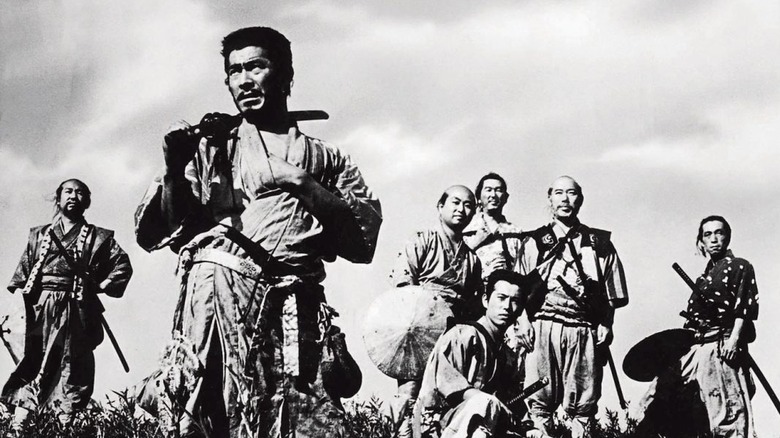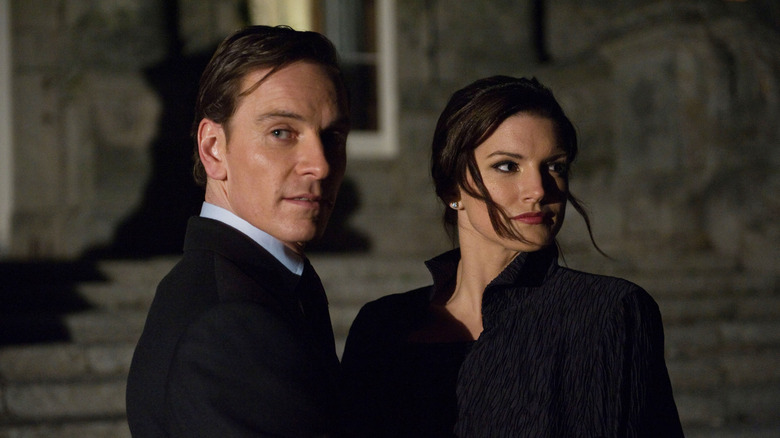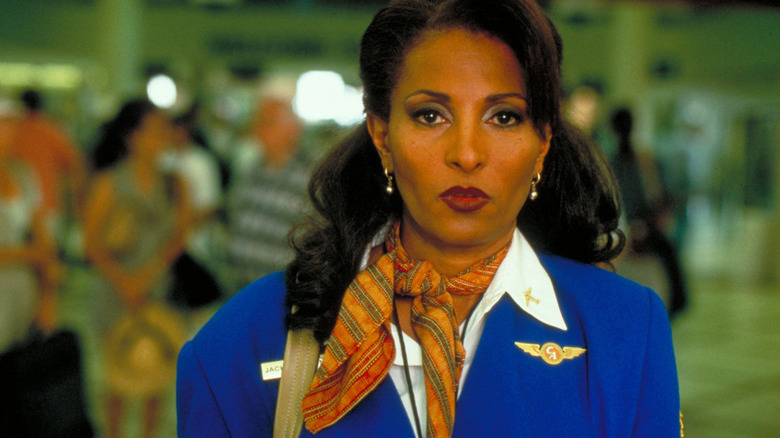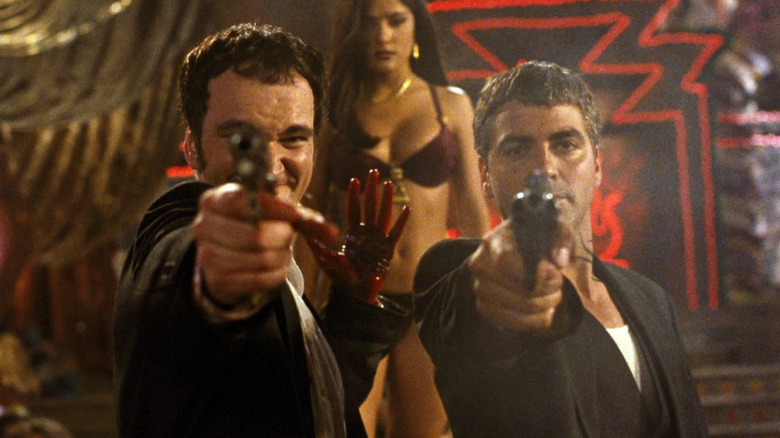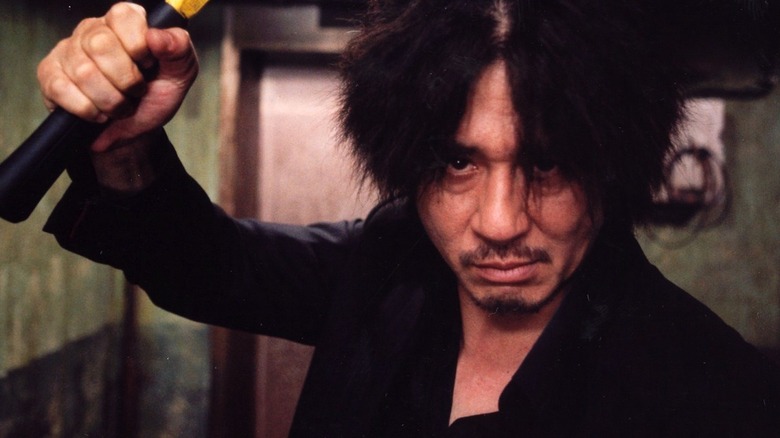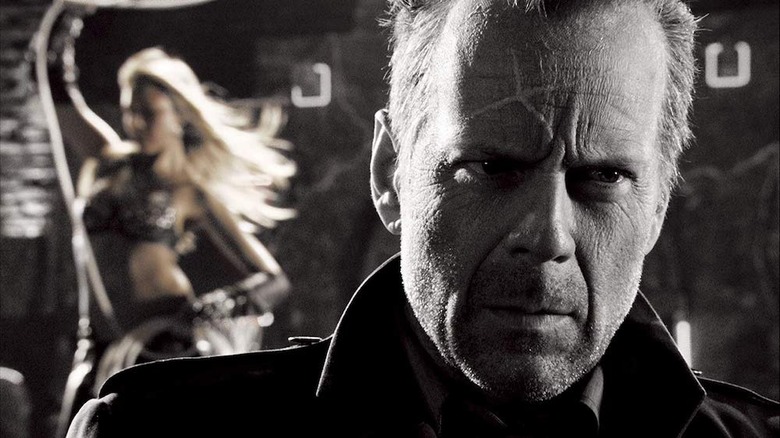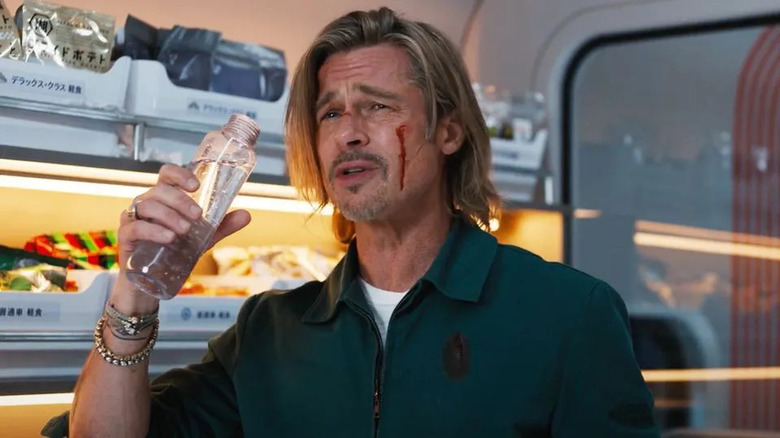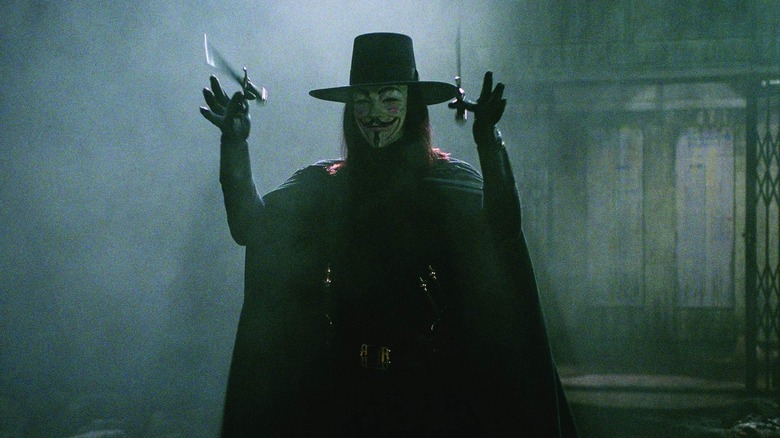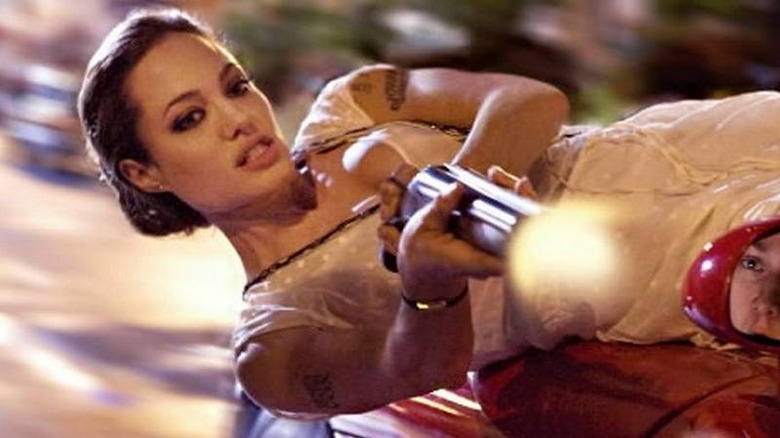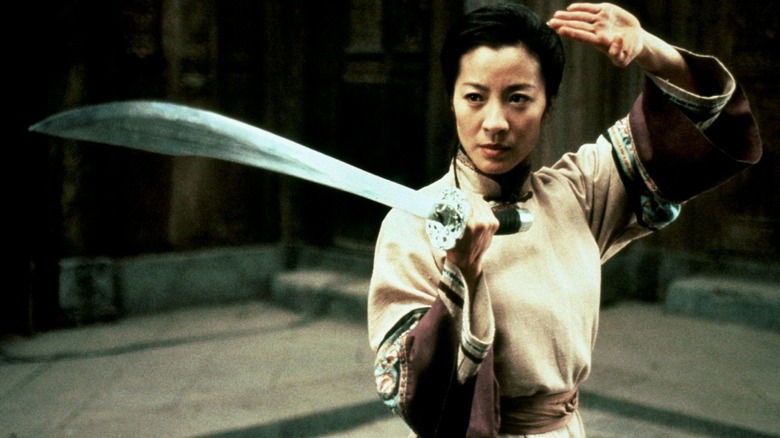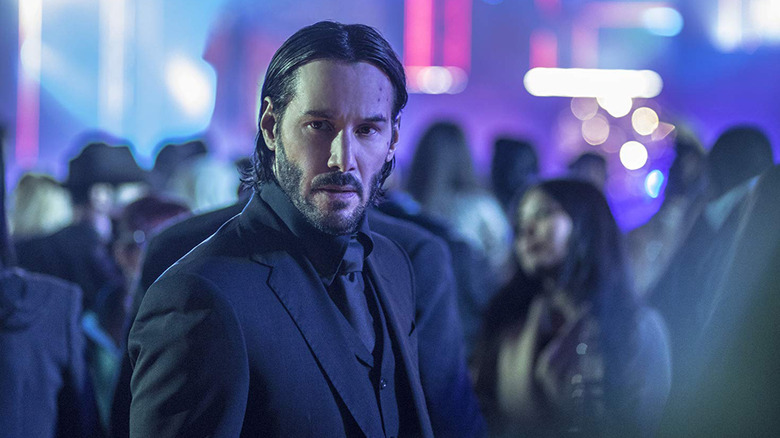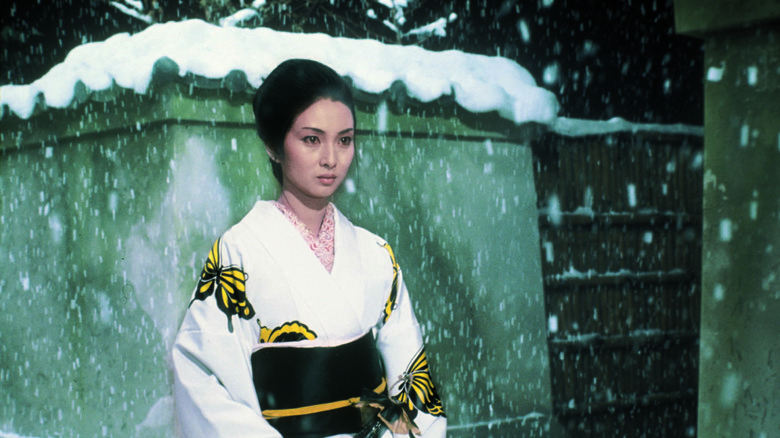15 Movies Like Kill Bill That You Need To See
When looking back at the most influential action movies of the 21st century, it's impossible to not mention the "Kill Bill" films. Quentin Tarantino delivered a mesmerizing spectacle that paid tribute to classics within the genre. There aren't many characters in the past few decades as iconic as The Bride (Uma Thurman). It's unlikely that we would be seeing as many great female-centric action films today if it wasn't for Thurman's performance.
Although it was released in two chapters, a synthesized version of the story titled "Kill Bill: The Whole Bloody Affair" has been seen by some lucky Tarantino fans. While the film's story was seemingly completed, Tarantino has teased the possibility of developing a third installment. Tarantino has often hinted at potential projects that he never ended up developing, but the possibility of "Kill Bill: Vol. 3" is pretty exciting. Here are 15 movies like "Kill Bill" that you need to see.
Atomic Blonde (2017)
While "Kill Bill" was certainly an action movie first and foremost, there is an element of mystery and intrigue that makes the story more compelling. There are hints of the noir genre within many of Quentin Tarantino's films, and "Kill Bill" was able to keep the audience engaged in The Bride's investigation in between the ruthless set pieces. "Atomic Blonde" finds a similarly fun mix of brutal action sequences, intriguing mysteries, and very dark humor. Both films feature some inventive non-linear elements, and spotlight a terrific female action hero.
Charlize Theron may have changed pop culture forever with her performance as Imperator Furiosa in "Mad Max: Fury Road," but her role in "Atomic Blonde" as the MI6 field agent Lorraine Broughton is just as dynamic. Similar to The Bride, Lorraine is dead-set on completing her mission but offers a few glimpses of her humanity. Theron shines in an epic stairway brawl that pushes her to the edge of defeat. "Kill Bill" was an influential moment of inspiration within the film industry, with The Bride as an awesome female protagonist who wasn't sexualized. "Atomic Blonde" was similarly a step forward with its inclusion of an intimate LGBT relationship.
Birds of Prey (2020)
One of the recurring issues within modern DC films has been the lack of good action sequences. It's hard to invest in Superman (Henry Cavill) as a character when he's trapped in a giant CGI battle that nearly destroys Metropolis. However, the 2020 spinoff film "Birds of Prey" was able to scale back the spectacle to deliver more intimate fight scenes.
Similar to "Kill Bill," "Birds of Prey" has no quarrels about getting pretty gruesome. The R-rated comic book adaptation features some graphic deaths used for comic relief. The zippy tone of the film plays around with non-linear storytelling in the same way that Quentin Tarantino did in "Kill Bill." It makes sense that a zany character like Harley Quinn (Margot Robbie) would tell a story that has a lot of distractions, detours, and confusing moments. While the other DC films were heavy on CGI battles, "Birds of Prey" features hand-to-hand combat sequences that feel closer to the sword fights in "Kill Bill." Director Cathy Yan may have inserted a more comedic tone, but the action scenes are refreshingly grounded in realism. She also inserts some stylistic flairs that make the film even more idiosyncratic.
Seven Samurai (1954)
Quentin Tarantino is a giant cinema buff and often speaks about the importance of watching classic films. When you're talking about the greatest martial arts films of all time, it would be impossible to not mention Akira Kurosawa. The brilliant Japanese director created many of the hallmarks of the genre. Narrowing down Kurosawa's greatest film is no easy task, but his 1954 epic "Seven Samurai" is a timeless classic that holds up remarkably well. There would be no "Kill Bill" without "Seven Samurai."
It follows a group of noble warriors hired to protect a small town from violent bandits. Although they are outnumbered and in danger, the seven samurai warriors are able to train the population of villagers to protect their homes. "Seven Samurai" makes the action sequences even more exciting due to the care put into the training montages, similar to The Bride's lessons with her instructor in "Kill Bill." Like Tarantino, Kurosawa wasn't afraid to introduce easily identifiable heroes and villains. Shinpei Takagi's performance as the ruthless leader of the bandits is one of the nastiest antagonists in film history.
Haywire (2011)
Both Quentin Tarantino and Steven Soderbergh became well known during the 1990s thanks to their highly influential work within independent cinema. As they accrued more acclaim, both directors began to steadily take on larger projects. "Kill Bill" was perhaps the most ambitious film in Tarantino's career at the time; while there were elements of action cinema in many of his films, he had never made a straight-up martial arts film. Soderbergh is one of the most versatile directors of his generation, but he had never made an espionage thriller quite like "Haywire" before.
"Haywire" follows the black ops agent Mallory Kane (Gina Carano) as she tries to find the men responsible for betraying her. While Carano might not have been quite as emotionally endearing as Thurman, she certainly proves her merit thanks to the film's frequent gunplay and hand-to-hand combat sequences. Apparently, Tarantino and Soderbergh are both directors that actors like working with because neither of them ever fails to put together an incredible ensemble cast. "Haywire" features standout supporting performances from Antonio Banderas, Michael Fassbender, Michael Douglas, Ewan McGregor, Channing Tatum, and Bill Paxton.
Jackie Brown (1997)
Quentin Tarantino has generated both praise and criticism throughout his career for his depiction of female characters. While some viewers have taken issue with some of his decisions, The Bride is undoubtedly one of his strongest characters. Tarantino gave Uma Thurman the freedom to flesh out the role and make it her own. However, it's not the first time he told a female-centric story. Tarantino's 1997 film "Jackie Brown" is one of the more underrated projects from his lengthy career in the industry. "Kill Bill" homages the history of martial arts cinema, and "Jackie Brown" does the same thing with its references to blaxploitation classics.
"Jackie Brown" is inspired by the Elmore Leonard mystery novel "Rum Bunch." The film follows the flight attendant Jackie Brown (Pam Grier) as she gets wrapped up in a smuggling plot. Similar to Thurman, Grier gives a defiant performance that resists sexualization and cliche. She gives Jackie a sense of agency as she's subjected to racist and sexist abuses. The Bride might be a pretty serious character, but Grier got to add some comedic moments to her performance, particularly in the hilarious interactions she has with Ordell Robbie (Samuel L. Jackson).
From Dusk Till Dawn (1996)
"Kill Bill" is a great example of Quentin Tarantino's ability to play around with genres. Although it's inspired by classic martial arts films, the "Kill Bill" movies have elements of dark comedy, noir, mystery, and romance. It's hardly the first time that Tarantino has subverted expectations about a film's narrative, having written the screenplay and even co-starred in the 1996 film "From Dusk Till Dawn," directed by his frequent collaborator Robert Rodriguez.
"From Dusk Till Dawn" starts off with a simple enough premise: the bounty-hunting brothers Seth (George Clooney) and Richie Gecko (Tarantino) go on the run after a violent shootout. The Gecko brothers kidnap the pastor Jacob Fuller (Harvey Keitel) and his daughter Kate (Juliette Lewis) as they cross over the border to Mexico in order to avoid justice. Sounds like any other crime movie, right? Wrong! "From Dusk Till Dawn" takes a wild direction when the characters arrive at a bar that is run by blood-sucking vampires. Tarantino's trademark quirky dialogue is on point. The fast-paced quips are intertwined with extended monologues in a fashion that is similar to "Kill Bill."
Oldboy (2003)
The two "Kill Bill" films are revenge stories about the lasting ramifications of trauma. Following the gruesome, heartbreaking scene in "Kill Bill Vol. 1" where The Bride swears to get revenge on Bill (David Carradine), the audience was invested in seeing her complete her mission. However, The Bride's goals are complicated after she recieves some stunning revelations in "Kill Bill Vol. 2." Quentin Tarantino proves that the best revenge films are the ones where the protagonist is forced to question what "vengeance" really means to them.
Park Chan-wook's 2003 action thriller "Oldboy" is one of the greatest revenge movies of all time, and boasts one of the most riveting plot twists in film history. It is a film where it's best to not know anything about the story before you actually see it. While "Kill Bill" fans probably have the stomach to handle violent content, the disturbing extremes that "Oldboy" goes to are incredibly upsetting. Similar to "Kill Bill," "Oldboy" intertwines an interesting mystery that makes the action sequences even more propulsive, and it also opens with a flashback that sets up an empathetic hero on his quest. It starts with a scene in 1988, where the alcoholic businessman Oh Dae-su (Choi Min-sik) is taken captive by unknown kidnappers. After 15 years in prison, Dae-su sets out on a mission to track down his torturers and find justice.
Sin City (2005)
One of the reasons that "Kill Bill" sticks out so vividly within the memory of action movie fans is its personality. The best action filmmakers are those with whom you can easily identify their style. You know you're watching a "Quentin Tarantino film," because nobody else combines raunchy dialogue and shocking violence in quite the same way. In an era that is now dominated by studios that seek "for hire" filmmakers, it's rare to see a major action film that truly feels like it was made by an auteur. Robert Rodriguez's 2005 film "Sin City" is one of the last examples of a mainstream studio action film that felt so distinct.
Rodriguez and Tarantino are lifelong friends, with the latter even visiting the set of "Sin City" and guest-directing a few scenes. Both Rodriguez and Tarantino embrace classic cinema by reinventing older genres and spinning them in a new direction. While "Kill Bill" is a throwback to old-fashioned samurai and martial arts films, "Sin City" is a fun retelling of noir, pulp, and crime stories. Like Tarantino, Rodriguez is a striking visual storyteller with an inventive eye: "Sin City" feels like it was plucked straight from the pages of Frank Miller's iconic graphic novels of the same name.
Bullet Train (2022)
"Kill Bill" has a complex history with its influences. While it's very much a tribute to the history of Asian cinema, placing a white protagonist at the center of the story could be deemed disrespectful. However, Quentin Tarantino does a really great job of honoring the Japanese culture that he is borrowing from and fleshing out the importance of their traditions. It doesn't feel like The Bride is stealing anyone's story, she simply learns to respect the eastern ways as she sets out on her journey of heroism.
David Leitch's action thriller "Bullet Train" has a similarly interesting role in the history of representation in cinema. While it is an American production, the film boasts an international cast and features set pieces that take place on a global scale. Based on the novel "Maria Beetle" by Kōtarō Isaka, the film follows the assassin Ladybug (Brad Pitt) as he travels by train to Kyoto to retrieve a briefcase. After he's pinned for the death of the son (Logan Lerman) of a Russian gangster (Michael Shannon), Ladybug must survive the long train ride with the other assassins. Ironically, Ladybug is a bit of a buffoon and it's really the Japanese yakuza known as "The Elder" (Hiroyuki Sanada) and his son Yuichi Kimura (Andrew Koji) that steal the show.
V for Vendetta (2005)
The "Kill Bill" films aren't just stunning action spectacles, they're surprisingly clever reimaginings of the "hero's journey" as it relates to the modern world. Can true heroism exist in a world as cruel and depressing as the one we live in now? While the events of "Kill Bill" are obviously fictitious and take place in Quentin Tarantino's very distinct version of reality, it's impossible to watch the mistreatment and subjugation that The Bride experiences and not think of real issues of sexism that are going on right now.
If you look to action cinema to see the parallels to today's new stories, then the graphic novel adaptation "V for Vendetta" may hit too close to home. The film takes place in a dystopian Great Britain, where a fascist government has taken complete control of the media and enforced a strict police state. The comparisons that can be drawn to recent events in American politics are downright eerie. However, "V for Vendetta" has some hope for the future, as it features a female protagonist worthy of The Bride thanks to Evey Hammond (Natalie Portman).
Wanted (2008)
One thing that modern action films are really missing is creativity. What's interesting about a group of super-powered heroes and villains fighting in the streets or an open field? "Kill Bill" was so much fun because Quentin Tarantino went anywhere and everywhere with his fight scenes. Between the snowy duel with O-Ren Ishii (Lucy Liu) in Okinawa in "Kill Bill Vol. 1" and the confrontation in Budd's (Michael Madsen) trailer in "Kill Bill Vol. 2," Tarantino certainly kept the audience on their toes.
The 2008 comic book film "Wanted" shows a similar tactility in its supernatural storyline. Based on the comic book miniseries of the same name, "Wanted" follows the unhappy office worker Wesley Gibson (James McAvoy) as he joins a secret society of assassins linked to his father. As Wesley begins his assignments with his mentor Fox (Angelina Jolie), he's thrust into chaotic circumstances by being forced to fight on the top of a train. It was a great way to get the audience engaged in Wesley's journey as he struggles to deal with strange circumstances.
Crouching Tiger, Hidden Dragon (2000)
Stylized yet somewhat beautiful action? A female protagonist that inspired countless imitators? A truly respectful homage to classic Asian cinema? An epic story of vengeance and family that manages to be both shocking and touching? You could be talking about the "Kill Bill" franchise or Ang Lee's masterful wuxia film "Crouching Tiger, Hidden Dragon." Like Quentin Tarantino, Lee is a filmmaker who is unafraid to embrace his influences, and the film is both beautifully grandiose and completely sincere.
Based on the novel of the same name by Wang Dulu, "Crouching Tiger, Hidden Dragon" takes place in China during the 19th century Qing dynasty. It follows the powerful warriors Yu Shu Lien (Michelle Yeoh) and Li Mu Bai (Chow Yun-fat) as they search for an ancient sword that has been stolen by a thief. Like Tarantino, Lee intertwines earnest emotional moments in between the jaw-dropping fight scenes, and the love story between the two main characters is surprisingly moving.
John Wick (2014)
The "Kill Bill" films do a pretty great job of generating empathy for the central character. The Bride is brutalized by Bill and swears to get vengeance. Revenge films risk being too disturbing if the main character is only working off of blind rage: it's important to have empathy for the person who is starting a violent rampage. What's the most justifiable reason that you can think of for wanting to get revenge? It probably has something to do with killing an innocent, adorable dog.
This is the premise that "John Wick" utilizes to its advantage. The titular assassin is already heartbroken at the beginning of the movie because of the death of his wife. However, John is finally pushed over the edge when a gang of Russian gangsters murder his dog and steal his car. Similar to the "Kill Bill" films, "John Wick" features stylized noir sequences and lots of great hand-to-hand combat. It sets up an intriguing world that was expanded in subsequent installments.
Lady Snowblood (1973)
There isn't a single film that had a greater influence on the "Kill Bill" franchise than the 1973 Japanese action movie "Lady Snowblood." The climax of "Kill Bill: Vol. 1" where The Bride confronts O-Ren in the middle of the snow is virtually identical to the ending of "Lady Snowblood." Quentin Tarantino may not be subtle in his classical film references, but he certainly can't be judged for loving this film. The electrifying female-fronted action movie features inventive storytelling devices that turn a simple story of revenge into an existential tragedy.
"Lady Snowblood" follows the young woman Yuki Kashima (Meiko Kaji) as she searches for the men who raped her mother and killed her father and brother. Similar to how The Bride crosses her targets off her list, Yuki takes out her enemies one by one. Both of their stories are told in part through flashbacks, with critical revelations about the past made in the third act.
